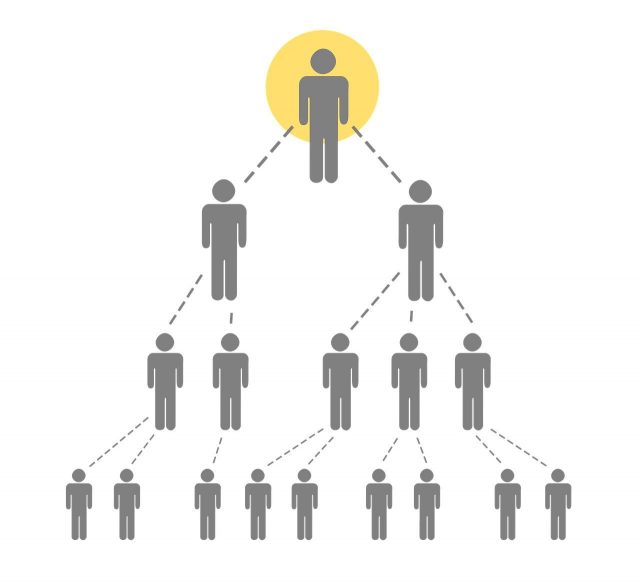The pandemic has significantly changed the landscape of American job opportunities. This consequently leaves many households struggling to make ends meet. Being your own boss and having no ceiling to your income potential sounds even better than it did before. Although these and many other perks go with being on a network marketing team, there’s a lot to learn. First, it’s crucial to understand the difference between network marketing and pyramid schemes.
What are Network Marketing and Pyramid Schemes?
To be successful, each business needs customers to bring in revenue. There are a few ways to attract them. An expensive way to attract customers is to advertise through television, radio, print ads and more. These companies aren’t network marketing companies nor pyramid schemes.
An alternative way to attract customers is much less expensive for businesses. Instead of spending up-front money on ads, these companies rely on word-of-mouth advertising, commission, and bonuses. This is where the difference between network marketing and pyramid schemes becomes apparent.
At first glance, these business models look quite similar. One person generally joins a company’s sales team and sponsors three people to do the same. Those three people sponsor three more and so on.
However, the key difference between the models is the product. According to Cornell Law School, “Legitimate multi-level marketing (MLM), also known as network marketing, is often confused with pyramid schemes because MLM offers a tiered compensation system whereby a member who recruits a new member will get a cut of that new member’s product sales commissions.”
In other words, a solid sales structure for the company’s products separates network marketing and pyramid schemes.
What the Federal Trade Commission Says about Network Marketing and Pyramid Schemes
The Federal Trade Commission explicitly set a precedent for legitimate network marketing companies over 40 years ago. Koscot Interplanetary, Inc. “offered the opportunity to become a ‘Beauty Advisor’ and sell cosmetics.” They explain, “The company’s incentive structure really did not encourage retail sales. Instead, it encouraged people to pay $2,000 for the title of ‘Supervisor’ and purchase $5,400 in Koscot cosmetics, and then to earn bonuses by recruiting others to make the same investments.”
The bonus structure motivated people to recruit more people, but not buy or use the cosmetics. Koscot Interplanetary, Inc. could not legally charge a fee for the right to sell their product nor to recruit someone to sell the product.
Is Amway Network Marketing or a Pyramid Scheme?
Markedly, the Koscott case set the precedent that would separate network marketing and pyramid schemes for decades to come. Around the same time, the Commission came to another milestone decision regarding Amway. Although Amway was dishonest about their earnings claims, it found that they’re not a pyramid scheme.
As said by the Commission, “It did not charge an up-front ‘head hunting’ or large investment fee from new recruits, nor did it promote ‘inventory loading’ by requiring distributors to buy large volumes of nonreturnable inventory. Instead Amway only required distributors to buy a relatively inexpensive sales kit. Moreover, Amway had three different policies to encourage distributors to actually sell the company’s soaps, cleaners, and household products to real end and users.”
How to Spot the Differences Between Network Marketing and Pyramid Schemes
Indeed, knowing the characteristics of network marketing and pyramid schemes is only half the battle. The other half, without a doubt, is knowing what to look for when you suspect a pyramid scheme.
The overall objective is to determine where the company is making the bulk of its revenue. For example, do they get more revenue from their product sales or new-recruit fees?
Signs of a Pyramid Scheme
Kati Daffan with the FTC Bureau of Consumer Protection says, “Sometimes a pyramid scheme might be trying to look like an MLM enterprise. We have some red flags that we encourage consumers to look out for.
- promises of unrealistic returns on investments
- high upfront fees or investments
- strong emphasis on the legality of the business
- no clear descriptions of products, services, or investments being offered
- no real underlying investment”
Once you find the right company for you, the key to success in network marketing is to work hard and have a good strategy. Many people have quit their jobs to be their own boss in network marketing. It’s certainly a feasible option for a healthy side income. We recommend choosing a product you love. Ask friends and family if they recommend a reputable company. With this in mind, browse this site for more information.
Sources
[1] “Investor Protection Guide: Pyramid Scheme.” Legal Information Institute, Legal Information Institute, www.law.cornell.edu/wex/investor_protection_guide_pyramid_scheme.
[2] Staff, Gray News. “Pandemic Sparks Increase in Network Marketing.” Https://Www.kait8.Com, 27 May 2020, www.kait8.com/2020/05/27/pandemic-sparks-increase-network-marketing/.
[3] Valentine, Debra A. “Pyramid Schemes.” Federal Trade Commission, 6 Mar. 2017, www.ftc.gov/public-statements/1998/05/pyramid-schemes.











